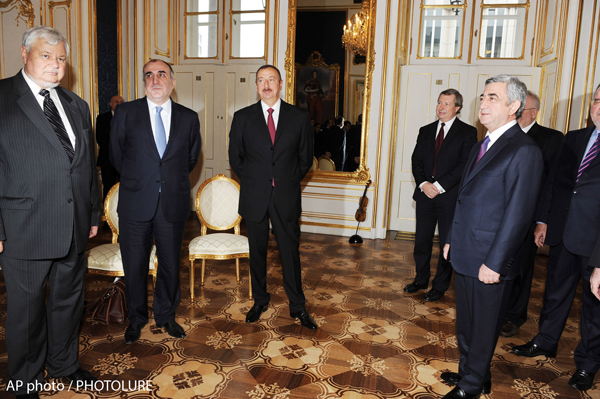All possible developments related to Armenia are associated with the answer to this question
Yesterday, two years after Sochi summit on January, 2012, the Presidents of Armenia and Azerbaijan met in Vienna. Serzh Sargsyan and Ilham Aliyev, according to journalists covering the meeting, were standing side by side, photographed, interviewed, but no shaking of hands. After the meeting, answering the questions of “Liberty” RFE/RL of how the talks were held, Serzh Sargsyan said, “normal.”
According to presidential press service, “During the tête-à-tête conversation, followed by a working meeting with the co-chairs, the leaders of the two countries’ discussed a wide range of issues related to the settlement of the Nagorno Karabakh conflict. The presidents agreed to promote further negotiations to achieve a peaceful solution and instructed Foreign Ministers to continue working with the co-chairs to achieve the goal. A new meeting was agreed on in the months to come. Working meetings with Ministers will be organized on the sidelines of the Kyiv-hosted Foreign Ministers Council session on December 5-6. The co-chairs plan to visit the region by the yearend.
After yesterday’s meeting in Vienna, the U.S. Secretary of State John Kerry had a phone conversation with Serzh Sargsyan, “The parties underscored that there is no alternative to a negotiated solution of the conflict and noted that it is necessary to find mutually acceptable mechanisms for the resolution of the conflict based on the fundamental principles,” said the official release. Kerry also had a phone conversation with the President of Azerbaijan, said he in Washington, in the joint press conference with Turkish Foreign Minister Ahmet Davutoğlu, “We strive to push the peace process forward, and we will continue our efforts.” Kerry added that the Nagorno-Karabakh conflict was discussed with Davutoğlu, highlighting that Turkey was a “great” role in this issue.
Read also
To recall that on November U.S. President Barack Obama sent a letter to Aliyev, urging him not to miss the historic possibility and use of meetings with Serzh Sargsyan for conflict resolution. Moscow was also expressing positive expectations for the negotiations. On November 18, at the meeting with Foreign Minister Edward Nalbandian in Moscow, RF Foreign Minister Sergei Lavrov said, “We hope that in the near future direct contacts between the leaders of Armenia and Azerbaijan will resume, we will help in every way, as I said before, for the establishment of required atmosphere to reach the settlement of the conflict, in compliance with the agreement reached earlier.”
One of the peculiarities of the Vienna meeting, perhaps, is that it was held on the background of express interests of involvement of official Ankara in the settlement process. Turkish Foreign
Minister Davutoğlu’s visit to Washington and his talks with Secretary of State Kerry initially were contacted with the topic of Nagorno-Karabakh conflict resolution. Turkish press reports that Davutoğlu will try to convince the U.S. to a new impetus to the negotiations on Nagorno-Karabakh. During the press conference held after the meeting with Kerry, Davutoğlu said, “We hope that the Nagorno-Karabakh conflict will be resolved in a short term and thereby will bring peace to the Caucasus region.”
Yesterday, the Kremlin released a statement saying that RF President Vladimir Putin will meet Turkish Prime Minister Recep Tayyip Erdoğan in Moscow on November 21-22. The 4th session of Council of high level of cooperation between Russia and Turkey is planned on those days in St. Petersburg. Erdoğan’s visit to Moscow will be held at the invitation of Putin. As to what will be discussed at the Russian-Turkish talks on Nagorno-Karabakh issue, it is difficult to predict, but it is clear that Ankara will also use the opportunity of this meeting to once again put forward requirements on the Nagorno-Karabakh settlement.
It seems like yesterday’s negotiations in Vienna were a chance to get things moving on a peaceful settlement of the Nagorno-Karabakh conflict, especially when the co-chairs will be organizing working meetings with the foreign ministers. However, if we review the current climate in the region, in what conditions the negotiations were held, the situation around this meeting is even more interesting.
The result of making Safarov a state hero by official Baku was that the Nagorno-Karabakh peace process was frozen for two years. In the meantime, RF signed a contract with Azerbaijan on four billion dollars of attacking weapons. Five years ago, Ankara failed the “football diplomacy” because of the Nagorno-Karabakh conflict. International community for a long time was convinced that at least the West has a complete understanding of this, and the Armenian side is in advantageous situation in the sense that the official Baku prevents the settlement of Nagorno-Karabakh conflict, and Ankara is blocking Armenia-Turkey relations due to the Nagorno Karabakh conflict.
On September 3, Armenia made an abrupt transition towards the Eurasian integration processes. Currently, Armenia, in addition to Moscow, seems, does not have another ally. It’s another matter as to what perception is prevailing in our authorities with regard to saying an “ally”.
Will Moscow support preservation or change of Karabakh status quo… All the possible developments related to Armenia are associated with the answer to this question.
By the way, Regnum news agency, yesterday, issued an interesting information. RF has planed to strengthen common anti-air defense system with Belarus, as well as to initiate establishment of similar regional systems with Armenia and Kazakhstan, the formation of such regional systems, said RF President Vladimir Putin at the meeting with servicemen in Kremlin. The latter added that
cooperation in such a format essentially increases the defense potentials of Russia and its allies, contributing to the strengthening of peace and stability in the Eurasian region.
Emma GABRIELYAN


























































